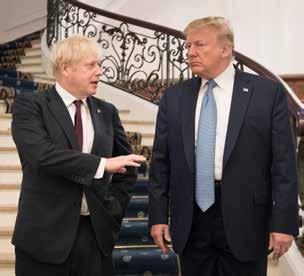
4 minute read
The Lessons of Brexit & Possible Parallels in the U.S. By Fred Bauer Brexit and populistAmerican politics differ in key respects, but they share some common political contexts worth noting in this election year
The Lessons of Brexit & Possible Parallels in the U.S.
by FRED BAUER
A populist surge has transformed politics on both sides of the Atlantic. Brexit and populist American politics differ in key respects, but they share some common political contexts. Both were informed by a broader alienation from the political establishment, which has led to an appetite for change and for outsider political figures. In both the United States and the United Kingdom, the traditional parties of the left have loosened their hold on working-class voters in the wake of cultural and economic changes. Populist-sympathetic voters have a mix of policy preferences. In the United States, they are often skeptical about high rates of immigration and the current architecture of global trade. Far from doctrinaire free-marketeers, these voters support a vigorous welfare state and are open to government regulation of large corporate interests. Even if many of these voters do not embody every element of social conservatism in their private lives, they also resent “politically correct” efforts to police speech and stigmatize social traditionalism.
The December 2019 parliamentary elections showed how a centerright party can profit from addressing populist sentiments. Boris Johnson’s “Get Brexit Done” message spoke to two audiences: populist voters eager to leave the European Union and voters exhausted by the extended constitutional torment caused by establishment resistance to implementing the 2016 referendum. Leaving the European Union will almost certainly cause considerable disruption to existing British financial, legal, and economic arrangements. That disruption offers both opportunity and, if poorly managed, peril. However, the continued battle over whether to implement Brexit at all had paralyzed British politics for years. “Get Brexit Done” offered a return to constitutional normalcy.
That said, Johnson’s campaign was not merely about constitutional questions. Recognizing that working-class Leave voters might be repelled by austerity politics, Johnson also offered proposals that spoke to the concerns of the economically precarious: increasing the number of doctors and police officers, adding to educational spending, and investing in infrastructure. That combination of populist policies and an end to Brexit paralysis helped break Labour’s “red wall” in the Midlands and Northern England while also stanching the bleeding in some traditionally Tory but Remain-friendly seats. (The scandals surrounding Jeremy Corbyn and the dominance of a more strident left in Labour likely contributed to the magnitude of Johnson’s win, but it would be a mistake to attribute Johnson’s sizeable majority merely to Corbynitis.)
British politics reveals some potential opportunities and pitfalls for Republicans in 2020. An increase in workingclass support was essential for President Trump’s victory in 2016 and in some down-ballot congressional races. After two elections supporting Barack Obama, blue-collar counties in the Rust Belt and elsewhere swung to Donald Trump. In 2018, however, many suburban voters turned against the Republican Party.
Republicans in 2020 need simultaneously to keep some of their traditional supporters in the suburbs while also expanding their reach among the working class in rural, suburban, and urban areas. With the right policy and messaging strategies, they can do both. Proposals for U.S. President Donald Trump and Britain’s Prime Minister Boris Johnson confer during a bilateral meeting at the G7 summit on August 25, 2019 in Biarritz, France.
health-care reform, for instance, might focus less on targeting government spending and more on expanding the supply of medical care (by training more doctors, for instance). Slashing corporate tax-rates, the 2017 tax-reform bill was in many respects a conventional piece of Republican tax policy, but it did include some elements that spoke more directly to the concerns of working families, such as raising the child taxcredit. Similar efforts to give working families more options could appeal to voters across the income spectrum. Reforms to the financial and tech sectors could address populist concerns about economic concentration. Steps to tighten the labor market could provide more opportunity for young people and working families.
Politics is not merely about policy, however. Rhetoric matters. One mode of populism embraces rhetorical pugilism, in which self-styled tributes of “the People” seek to shock various “coastal elites.” However, leading with an inflammatory, culture-war message often results in diminishing political returns: it alienates upscale suburbanites while not necessarily driving working-class voters to the polls. A different approach would combine proworker economic policies with a more inclusive messaging that stresses a common civic fellowship.
Though much media attention has focused on the rise of populist energies in the Republican Party, populism is also transforming the Democratic Party. A newly energized left has pushed the Democratic policy leftwards on both economic and cultural issues, though there has been a considerable intraparty battle on whether to prioritize cultural or economic messaging in 2020.
The populist challenge to established political arrangements could cause despair in some quarters. But policymakers could also see in that challenge an opportunity to take on the hard work of policy reform and institutional renewal. RF Fred Bauer is a writer from New England. Both were informed by a broader alienation from the political establishment, which has led to an appetite for change and for outsider political figures.








